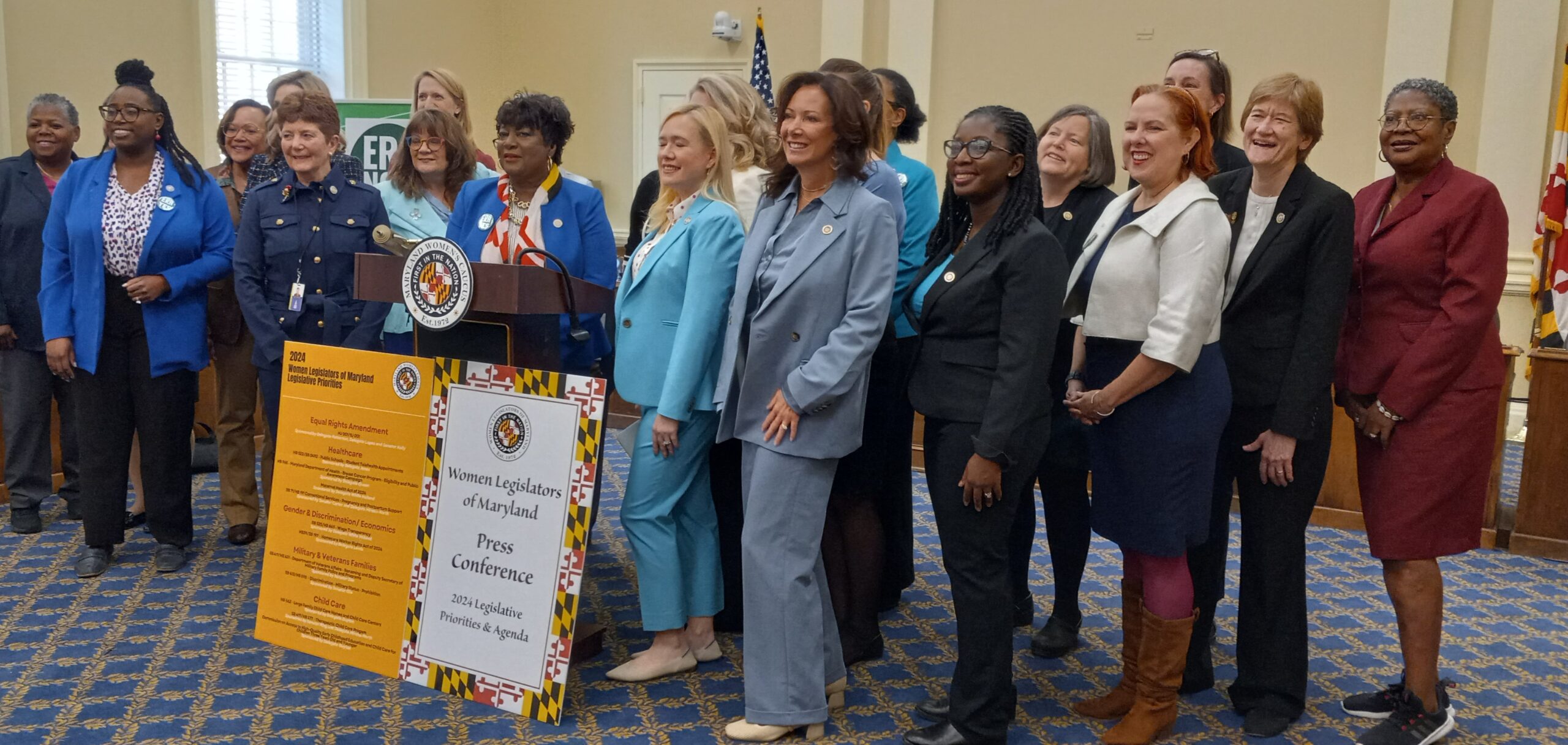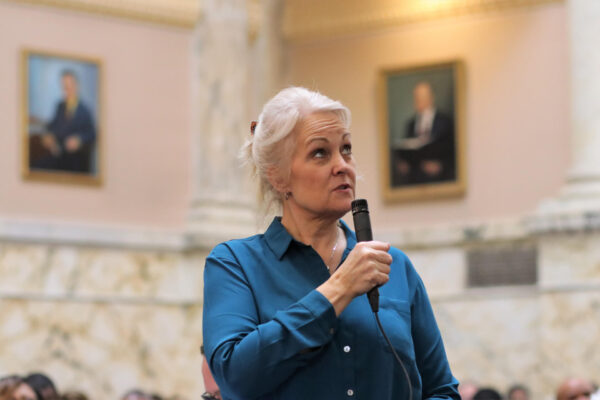Legislative women’s caucus remains a one-party affair

About 30 members of the legislative women’s caucus — known formally as the Women Legislators of Maryland — gathered earlier this month at a news conference to discuss their priorities for this legislative session. The agenda items included support for the Equal Rights Amendment, expanded child care programs and workers’ rights.
“When we think about the women’s caucus, our priorities have really not changed since we began 52 years ago,” said Del. Edith J. Patterson (D-Charles), the president of the group.
Notably, none of the eight Republican women serving in the General Assembly was present.
Two years ago, the Republican members of the caucus resigned in protest when one of their own was bypassed to be the group’s president. The oldest women’s legislative caucus in the nation has been a bipartisan group since its inception more than half a century ago, with a loose tradition — one that was occasionally interrupted, without too much rancor — of electing Republicans and Democrats to be their leader every other year.
But two years ago, Del. Lesley J. Lopez (D-Montgomery), who was second in line in the caucus chain of command, leapfrogged Del. Lauren Arikan (R-Harford), a vocal conservative and the first vice president, who expected to be elected president for the year. Republican women resigned and effectively boycotted the caucus in 2023, though a couple of GOP women attended a few informal gatherings and receptions for women lawmakers.
This year, Democratic and Republican women do not seem any closer to a rapprochement.
In an interview, Patterson said that when she took over as caucus president, she reached out to Del. Kathy Szeliga (R-Baltimore County), one of the senior GOP members of the General Assembly and a leading conservative, about having the Republicans rejoin the caucus, but so far there has been no movement.
“They’ve decided not to participate at this time,” Patterson said.
There are 72 Democratic women in the General Assembly, compared to the eight Republicans — a group that includes House Speaker Adrienne A. Jones (D-Baltimore County) and chairs of three of the legislature’s 10 standing committees.
Szeliga in an interview said the Republicans at this point have complaints about both the governance and the priorities of the women’s caucus.
“I’m really disappointed and hurt that the women’s caucus has taken measures to exclude the minority [party] members of the House and Senate,” she said. “It’s very clear that they’re now the Maryland Democrat women’s caucus.”
The caucus agenda has moved perceptibly to the left in the last two years. When both parties were participating, the caucus priorities largely focused on issues like women’s and children’s health, child care, and challenges women face in the workplace.
But last year, the caucus made abortion rights one of its top priorities, staking out positions that were anathema to most Republican women in the legislature (Szeliga called them “very radical measures”) And this year, the caucus has made passing a resolution calling on President Biden and Congress to affirm that the Equal Rights Amendment has gotten enough support to become the 28th Amendment to the U.S. Constitution a top priority.
That’s a complicated calculation that requires the U.S. House and U.S. Senate to pass a bill that would lift Congress’ self-imposed 1982 deadline for three-fourths of states — or 38 — to ratify the Equal Rights Amendment.
In 1972, Congress passed the ERA and sent it to the states for ratification, as outlined in the Constitution. Lawmakers imposed a seven-year deadline for the 38 states to ratify the measure
Only 35 had ratified the amendment by 1978, so Congress extended the deadline to 1982. But the last three states needed did not ratify the amendment until between 2017 and 2020 — decades after the 1982 cutoff.
ERA supporters across the country are pushing Congress to declare the measure amendment ratified, but are encountering resistance on Capitol Hill. The women’s caucus sponsored a rally on Lawyers Mall in Annapolis on Monday afternoon, which featured speeches from Lt. Gov. Aruna Miller (D) and Senate President Bill Ferguson (D-Baltimore City).
“Maryland has been fighting for gender equality to be codified in the U.S. Constitution for over 60 years, and we won’t stop now,” Ferguson said in a statement on social media Monday.

Del. Kathy Szeliga (R-Baltimore County) speaks on the floor of the House of Delegates. File photo by Danielle E. Gaines.
Szeliga called the resolution that the women’s caucus is championing “100% virtue signaling,” and added, “If they pass it, it means nothing. It only proves that the Maryland women’s Democrat caucus is irrelevant.”
Szeliga said the Republican women in the legislature have discussed launching a caucus of their own, but haven’t found the time.
Patterson said the GOP’s refusal to reengage with their Democratic colleagues in the women’s caucus, while unfortunate, “is entirely their decision.”
The other bills the women’s caucus is prioritizing this legislative session are:
- A measure from Del. Dana Jones (D-Anne Arundel) and Sen. Cheryl C. Kagan (D-Montgomery) to increase student telehealth services. The House bill has been voted out of the Ways and Means Committee while the Senate bill is scheduled for a hearing in the Committee on Education, Energy and the Environment on Feb. 28.
- A bill by Del. Pam Queen (D-Montgomery) to expand mammograms and clinical breast examinations made available to women under the state’s Breast Cancer Program. The bill will be heard in the House Health and Government Operations Committee on Feb. 28.
- A bill from Del. Jennifer White Holland (D-Baltimore County) and Sen. Arthur Ellis (D-Charles) to expand maternal health services in the state. The House hearing is March 6 in Health and Government Operations and the Senate hearing is March 14 in the Finance Committee.
- Legislation from Sen. Jill P. Carter (D-Baltimore City) and Bernice Mireku-North (D-Montgomery) that sets conditions for incarcerated women to receive maternal health services. The bill awaits action by the Senate Judicial Proceedings Committee and the House version is being heard Feb. 27 in the Judiciary Committee.
- An equal pay for equal work wage transparency bill sponsored by White Holland in the House and Sen. Ariana B. Kelly (D-Montgomery). The House hearing is Wednesday in the Economic Matters Committee and Finance will hear the Senate bill on Thursday.
- A bill from Del. Robbyn Lewis (D-Baltimore City) and Ellis boosting the rights of home health care workers. It has already been heard in both the Health and Government Operations and Finance committees.
- A bill from Sen. Dawn Gile (D-Anne Arundel) and Del. Andrew Pruski (D-Anne Arundel) renaming the state Department of Veterans Affairs to be the Department of Veterans and Military Families, expanding the duties of the agency and adding extra protections for military families. The bill has been heard in House and Senate committees.
- Gile’s bill, also sponsored by Del. Adrian Boafo (D-Prince George’s), to prohibit discrimination against military spouses in the workplace. The bill, a top priority of Gov. Wes Moore (D), has already been heard in House and Senate committees.
- A bill by Del. Michele Guyton (D-Baltimore County) that would tighten requirements for teachers in large child care centers. The bill has already been heard in the Ways and Means Committee.
- Another child care bill by Guyton, that would create a commission to study implementing universal access to high-quality early childhood education and child care for children 3 years old and younger. The bill will be heard in the Ways and Means Committee on Feb. 28.
- A bill by Mireku-North and Sen. Nancy J. King (D-Montgomery) to increase funding for the state’s Therapeutic Child Care Grant Program. It has been heard in both the House and Senate.




 Creative Commons Attribution
Creative Commons Attribution